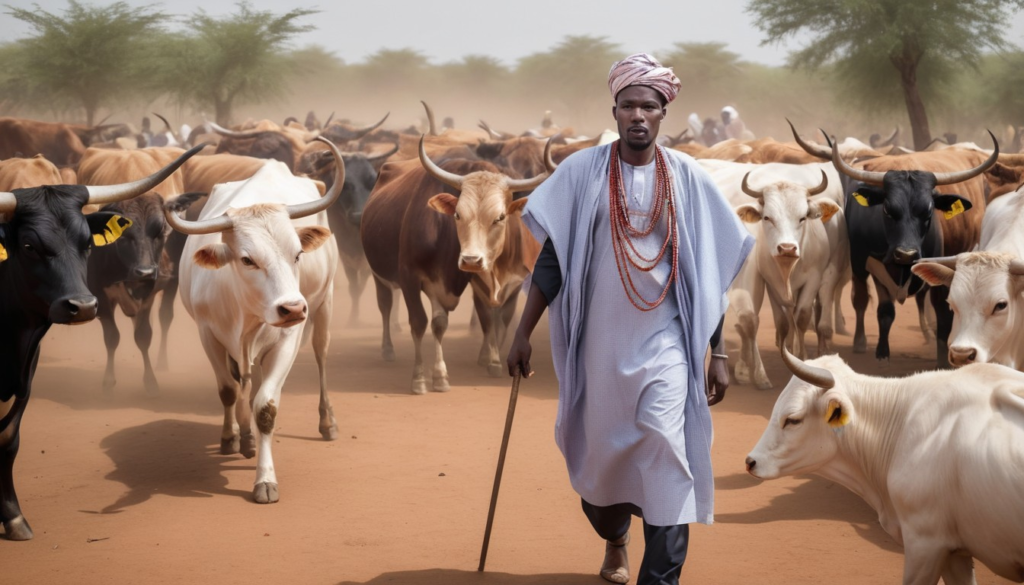Note: In this chilling query of the Northern Elites, Senior Politician and Spokesman of Former Governor Ayo Fayose of Ekiti State, Lere Olayinka wonders why Northern Politicians and bigwigs appear to have maintained a conspiracy of silence in the face of growing killings and abductions in the region. He argues for state police and the sentiment that Southern Nigeria must be secured before it is too late

In Yorubaland, there is this popular saying that, “Gàmbàrí pa Fúlàní ò lẹ́jọ́”, meaning “there is no case, if a Hausa person kills a Fulani person.”
In those days, the Yoruba people of Southwest Nigeria as well as some parts of the South-South (Midwest) and North Central (Middlebelt) see the Hausa and the Fulani as homogenous people. Therefore, a fight between a Hausa man and a Fulani person is seen as a squabble between two siblings.
Gàmbàrí is a corrupted version of Kyamberi or Kyambari, one of the three major ethnic groups that existed in the Northern Nigeria before the arrival of the Fulanis. The Kyambaris mainly existed in on the banks of River Niger across current day Kebbi, Zamfara and Niger States.
However, the Yorubas referred to the Hausas as Gàmbàrí.
Today, the North is being ravaged by terrorism and banditry. Strangely, on these two monsters, the North appears to be cool. The North is not bothered about the killing and kidnapping of its own people by its own people.
In one week, between February 29 and March 6, over 500 Northerners were kidnapped by terrorists and bandits.
First, it was the abduction of over 200 Internally Displaced Persons (IDPs) by Boko Haram terrorists in Gamboru Ngala town, Borno State. To follow was the abduction of 287 pupils and teachers of the Government Secondary School and LEA Primary School, Kuriga 1, in the Chikun Local Government Area of Kaduna State.
As I was writing this, report also came in that bandits have kidnapped an unspecified number of Tsangaya students at Gidan Bakuso in Gada local government area of Sokoto State. The propiretor of the school, Liman Abubakar, said that 15 students were unaccounted so far but “we are still counting.”
According to Abubakar, the bandits invaded the town around 1am, shot one person and abducted a woman.
On the abducted IDPs in Borno State, Nigerians only got to know through the foreign media. It also took the United Nations (UN) to confirm the abduction and not the Borno State Government.
In a statement on Wednesday, Mohamed Fall, UN resident and humanitarian coordinator in Nigeria, said the abductees, comprising women, boys and girls, were kidnapped when they went to fetch firewood.
Mind you, Senate Majority Whip, Ali Ndume
is from this same Borno State. He has been in the National Assembly since 2003.
Senator Ndume’s voice was among the loudest on the relocation of Federal Airport Authority of Nigeria (FAAN) and some departments in Central Bank of Nigeria (CBN) from Lagos to Abuja. He said the relocation will brew a political crisis in the country.
However, in Ali Ndume’s Borno State, over 200 IDPs were abducted by terrorists few days ago, he is yet to say a word. Perhaps, to him, abduction of over 200 of his own people in Borno State is not enough a national crisis already.
Senator Ndume is like most other leaders in the North, who are always more concerned about issues of politics and religion than the welfare of their people.
When for first time since 1979 that Mobolaji Ajose Adeogun left office as Minister of the Federal Capital Territory (FCT), Chief Nyesom Wike, a Southern Christian was appointed as FCT Minister, there was noise everywhere from some Northern religious leaders, demanding a reversal of the appointment.
Same uproar followed a musical video of Davido Music Worldwide, DMW, act, Logos Olori’s single ‘Jaye Lo’. Some notable Social Media Influencers in the North even took it upon themselves to campaign against Davido then. Good that Davido eventually deleted the controversial music video.
However, I am yet to see the same level of coordinated uproar against this week’s abduction of over 500 northerners in Borno and Kaduna States as well as bandits attack on a mosque in Birnin Gwari Local Government Area of Kaduna State, in which two worshippers were killed.
Or isn’t it strange that the same Northern leaders who were shouting up and down over the relocation of FAAN and some departments in CBN from Abuja to Lagos are silent over the kidnapping of over 500 Northerners in just one week?
More strange is what I read today, that the Kaduna State government is reaching out to the terrorists that abducted those 287 pupils and teachers on Wednesday, through a “popular bandits negotiator.”
The negotiator was said to be the one who negotiated the return of those students abducted in Katsina State years.
Note the title of the said individual, POPULAR BANDITS NEGOTIATOR!
So in Northern Nigeria, negotiating with terrorists for the release of abducted Nigerians is now a profession. Sad, very sad!
Interestingly, the North appears to be cool with these twin menaces of terrorism and banditry.
When BBC Africa Eye brought it to the forefront of global attention in its July 24, 2022, documentary titled “The Bandit Warlords of Zamfara,” it was seen as normal.
Is the North cool with its own suffering, as long as those affected are the poorest of the poor? I guess the answer is yes.
If a man is not concerned about a criminal who is always coming to his house to molest his wife and daughters, such that he will raise the alarm and call for help, why should the neighbours be concerned as long as the criminal does not extend his criminality beyond the man’s house?
Èmi ò ní kí olóko má lọ oko, èmi ò ní kí olódò má lọ odò, kó sáà jẹ́ kí un lọ tèmi kí un dé (I won’t prevent whoever going to his farm and stream from going, as long as he does not prevent me from going to my own farm and returning) is a popular saying in Yorubaland.
Another one is Èmi ò ní kí Gàmbàrí má sun rárà, kó sáà má ki oríkì ilé bàbá tè mi (I will not prevent a Hausa man from chanting eulogies, he should only not chant my family’s Praise Poetry).
Therefore, Gàmbàrí pa Fúlàní ò lẹ́jọ́ as long as Gambari will restrict killing of its Fulani to its own territory.
However, for this Gàmbàrí not to extend the killing of its Fulani beyond the North, Governors and leaders in Southern Nigeria need to come together and devise means of securing the entire region from terrorists.
Sadly though, this Gàmbàrí has already extended the killing of its Fulani beyond its territory. The Middlebelt and Southwest are already bleeding from insecurity.
Therefore, for the Southern Nigeria not to get to that level that over 500 citizens will be kidnapped in one week and things will appear normal, urgent and proactive actions must be taken.
One of such actions is the banning of open grazing across Southern Nigeria.
If anyone wants to move cows from Maiduguri to Lagos for instance, let the person move them through the roads with vehicles. If anyone wants to do Cattle Farming, let such a person get a ranch.
The Southern Nigeria must be secured before it is too late.
Most importantly, let each State carry its own security cross going forward.
For instance, why should a military personnel from my Ekiti State be the one to go and fight terrorists in Borno or bandits in Katsina?
Why should money meant for the entire people of Nigeria be spent to fight bandits who are terrorising their own people and those being terrorised seem to be cool with the terrorism?
Why should the irresponsibility of some people be allowed to become the problem of everyone?
Afterall, those 287 pupils abducted in Kaduna State on Wednesday, were abducted by their fellow northerners. The professional bandits negotiator contacted by the Kaduna State government to reach out to the bandits is also a northerner. He knows the bandits and the bandits know him.
In other words, the abductors speak the same language as those they abducted.
So if the North wants to keep killing and kidnapping the North, why should that be allowed to become a burden on other parts of Nigeria?
After all, Gàmbàrí pa Fúlàní ò lẹ́jọ́ nah.
Olayinka lives with the Irunmales of Oke Agbonna in Okemesi Ekiti.








